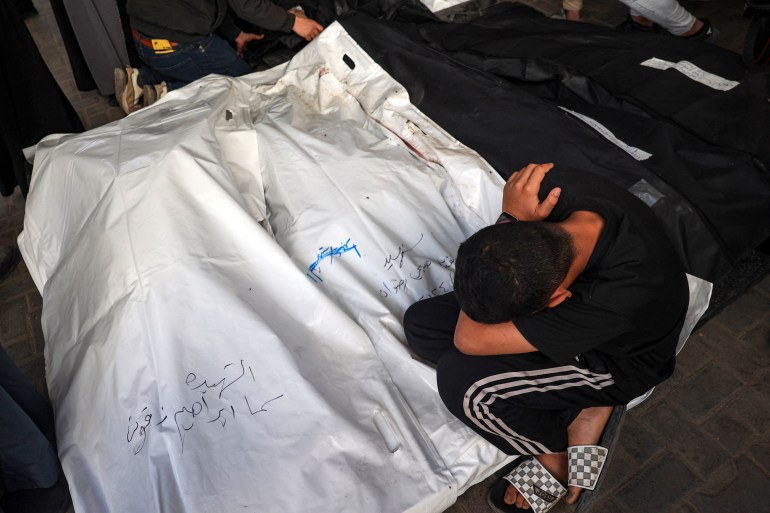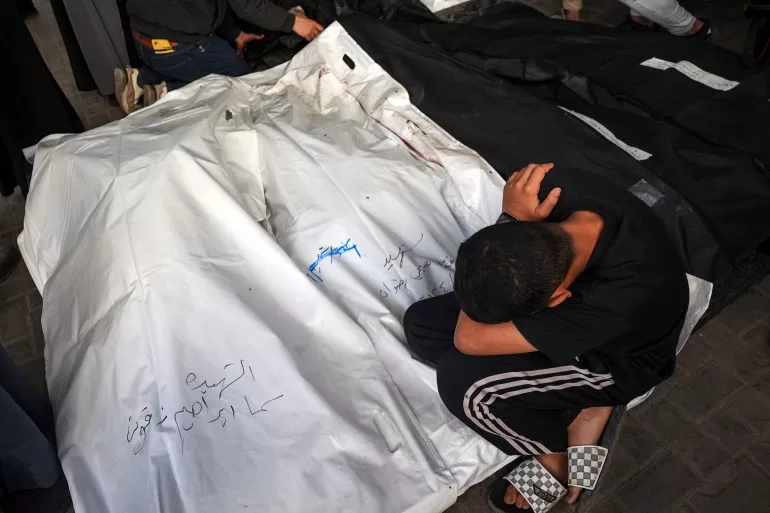Funerals were held on Saturday for those killed in the deadly strike on Rafah’s western Tal as-Sultan neighbourhood the night before, according to Gaza’s civil defence.
At al-Najjar Hospital, the site of the area’s main morgue, relatives sobbed and hugged white-shrouded children’s bodies. “Hamza my beloved. Your hair looks so pretty,” a mourning grandmother said.
The fatalities included Abdel-Fattah Sobhi Radwan, his wife Najlaa Ahmed Aweidah and their three children, according to his brother-in-law Ahmed Barhoum. Barhoum lost his wife, Rawan Radwan, and their five-year-old daughter, Alaa.
“This is a world devoid of all human values and morals,” Barhoum told The Associated Press, crying as he gently rocked Alaa’s body.
“They bombed a house full of displaced people, women and children. The only martyrs were women and children.”

The scene of bodies being transferred from al-Najjar Hospital to their final burial was heartbreaking, Al Jazeera’s Hani Mahmoud said, reporting from Rafah.
“The majority were children, wrapped in white sheets soaked in blood … We spoke to a doctor from the hospital [where the children were brought] who described them as having devastating wounds, soaked in blood,” he said.
“Their burns were so bad that even if they made it to the hospital alive, they would have quickly lost their lives because there’s no way such injuries could be treated right away given the current situation.”
Al Jazeera’s reporters said the Israeli military continued its assault on the city on Saturday. “There has been no let-up in the fighting,” said correspondent Tareq Abu Azzoum.
‘No plans for food, water, civil services’
Israel has been promising a major invasion into Rafah, which hosts more than half of Gaza’s population of about 2.3 million and is the only area in the territory to have been spared Israel’s ground forces so far.
According to two Gaza war monitors, the Institute for the Study of War (ISW) and the Critical Threats Project (CTP), United States and Israeli officials held a high-level “virtual meeting” on Thursday to discuss a Rafah incursion.
The US-based think-tanks said Israel shared with the US its plan to move some 1.4 million Palestinian civilians out of Rafah ahead of its promised ground invasion; however, the plan did not include “concepts for access to food, water and other civil services” according to reports.
Al Jazeera’s Abu Azzoum said Rafah has been witnessing a surge of Israeli military strikes in the past couple of weeks and these attacks could be seen as a sign that further military incursion could be carried out, specifically in light of Israel’s mobilisation of its troops near the border with Rafah.
“Right now, we are in central Rafah, and we can clearly see in the sky above the Kuwaiti Hospital, at least four Israeli military surveillance drones, hovering at a very low altitude,” he said.
“Different areas have been attacked in Rafah … One of the latest strikes targeted an empty house on the western side of that very densely populated area.”
Additionally, there were Israeli strikes on other areas of the Gaza Strip on Saturday, including the Jabalia, Nuseirat, Maghazi and Bureij refugee camps, our correspondent said.
More than 34,000 people have been killed and over 76,900 wounded in Israel’s war on Gaza since October 7.







